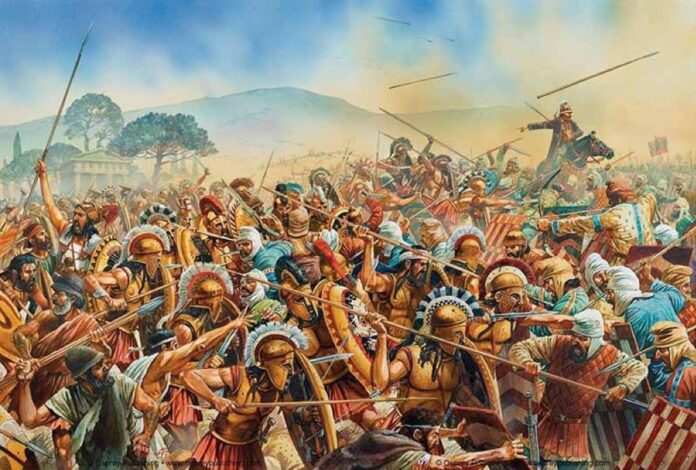On August 20, 479 B.C. the cities of Athens and Sparta, with some of their allies, definitively defeated the Persian King of Kings Xerxes I, at Plataea, and shortly thereafter in the naval battle of Mycale.
But Plataea was the decisive battle, where 300,000 Persians led by General Mardonius, with their 10,000 ‘immortal’ warriors, faced 107,000 Greeks led by the Spartan Pausanias, leaving 98,000 dead on the field. Nine years later the Persians had another defeat at Eurimedonte, definitively renouncing the conquest of small and proud Greece.
The battle was celebrated by an elegy of Simonides, commissioned by the Spartans, some fragments of which have survived: “[And I invoke you] to my aid, Muse [of many names, if you ever care] of human prayers. [Prepare] also this sweet ornament of my song, so that one may remember [in the future] the men who turned [the servants] away from Sparta [and from Hellas …] and did not forget the value, [and the glory was] high up to heaven, [and fame] among men will be immortal” (translated by Carlo Odo Pavese).
And as Herodotus wonderfully says, “That day they steadily gave way to freedom for Europe”. Words to be carved in the stone of history, because if the Persians had won in Plataea we would not have had democracy, philosophy, science, theater, classical art. If the Persians had won, Greece would have become an ordinary satrapy, with citizens enslaved to imperial power, over which one of the cruelest kings reigned, i.e. Xerxes I. The latter, as Herodotus narrates, ordered to kill his brother Masiste together with his wife and children, only because the woman did not want to give in to his desires. We must be grateful to those brave Greek soldiers and commanders, because they transmitted the Western culture to us, with its values of individual freedom in every field, with its culture, its art, secularism and religious tolerance.
There will be other war episodes in the centuries to come that will preserve our civilization: the Second Punic War (216-202 BC Rome vs Carthage), the Battle of Poitiers (732 AD, against the Arabs), the Battle of Lepanto (1571 AD against the Ottomans). But that of Plataea, together with the previous one of Marathon (490 BC), remains perhaps the most decisive. Actually, the loss of those neo-born values in Greek civilization, even though we want to believe in an evolutionary and Promethean purpose of history, would perhaps have delayed by centuries their the translation of those values.
Millenni di gratitudine per Atene e Sparta
Il 20 agosto del 479 a.c. le città di Atene e Sparta, con parte dei loro alleati, sconfiggevano definitivamente il Re dei Re persiano Serse I, a Platea, e poco dopo nella battaglia navale di Micale.
Ma Platea fu la battaglia decisiva, dove 300.000 persiani guidati dal generale Mardonio, con i loro 10.000 guerrieri ‘immortali’, affrontarono 107.000 greci guidati dallo spartano Pausania, lasciando sul campo 98.000 morti. Nove anni più tardi i persiani subirono un’altra sconfitta a Eurimedonte, rinunciando definitivamente alla conquista della piccola e orgogliosa Grecia.
La battaglia fu celebrata da un’elegia di Simonide, commissionata dagli Spartani, di cui ci sono giunti alcuni frammenti: “[Ed io ti invoco] in mio aiuto, Musa [dai molti nomi, se mai ti curi] delle preghiere umane. [Appresta] anche questo dolce ornamento di mio canto, affinché uno si ricordi [in futuro] degli uomini che allontanarono [la servitù] da Sparta [e dall’Ellade…] e non dimenticarono il valore, [e la gloria era] alta fino al cielo, [e la fama] tra gli uomini sarà immortale” (trad. di Carlo Odo Pavese).
E come dice splendidamente Erodoto “Quel giorno procurarono in modo stabile la libertà all’Europa”. Parole da scolpire nella pietra della storia, perché se a Platea avessero vinto i Persiani non avremmo avuto la democrazia, la filosofia, la scienza, il teatro, l’arte classica. Se avessero vinto i Persiani la Grecia sarebbe diventata una satrapìa qualsiasi, con i cittadini asserviti al potere imperiale, su cui regnava uno dei re più crudeli e codardi, Serse I, che, come racconta ancora Erodoto, fece uccidere suo fratello Masiste con moglie e figli, solo perché la donna non voleva cedere alle sue voglie. A quei valorosi soldati e comandanti greci dobbiamo la salvezza della cultura occidentale, con i suoi valori di libertà individuale in ogni campo, con la sua cultura, la sua arte, la laicità e la tolleranza religiosa.
Vi saranno altri episodi bellici nei secoli a venire che preserveranno la nostra civiltà: la seconda guerra punica (216-202 a.c. Roma vs Cartagine), la battaglia di Poitiers (732 d.c., contro gli arabi), la battaglia di Lepanto (1571 d.c. contro gli ottomani). Ma quella di Platea, insieme alla precedente di Maratona (490 a.c.), resta forse la più decisiva, poiché la perdita di quei valori appena nati nella civiltà greca, pur volendo credere ad un fine evolutivo e prometeico della storia, avrebbe forse ritardato di secoli la loro affermazione.








